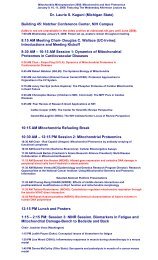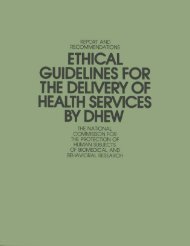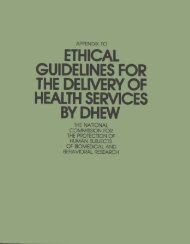RESEARCH ON THE FETUS - National Institutes of Health
RESEARCH ON THE FETUS - National Institutes of Health
RESEARCH ON THE FETUS - National Institutes of Health
Create successful ePaper yourself
Turn your PDF publications into a flip-book with our unique Google optimized e-Paper software.
H. Synthesis. The Commission concludes that certain prior conditions<br />
apply broadly to all research involving the fetus, if ethical considerations are<br />
to be met. These requirements include evidence <strong>of</strong> pertinent investigations in<br />
animal models and nonpregnant humans, lack <strong>of</strong> alternative means to obtain the<br />
information, careful assessment <strong>of</strong> the risks and benefits <strong>of</strong> the research, and<br />
procedures to ensure that informed consent has been sought and granted under<br />
proper conditions. Determinations as to whether these essential requirements<br />
have been met may be made under existing review procedures, pending study by<br />
the Comission <strong>of</strong> the entire review process.<br />
In the judgment <strong>of</strong> the Commission, therapeutic research directed toward<br />
the health care <strong>of</strong> the pregnant woman or the fetus raises little concern, provided<br />
it meets the essential requirements for research involving the fetus, and<br />
is conducted under appropriate medical and legal safeguards.<br />
For the most part, nontherapeutic research involving the fetus to be<br />
carried to term or the fetus before, during or after abortion is acceptable so<br />
long as it imposes minimal or no risk to the fetus and, when abortion is involved,<br />
imposes no change in the timing or procedure for terminating pregnancy which<br />
would add any significant risk. When a research protocol or procedure presents<br />
special problems <strong>of</strong> interpretation or application <strong>of</strong> these guidelines, it should<br />
be subject to national ethical review; and it should be approved only if the<br />
knowledge to be gained is <strong>of</strong> medical importance, can be obtained in no other<br />
way, and the research proposal does not <strong>of</strong>fend community sensibilities.











